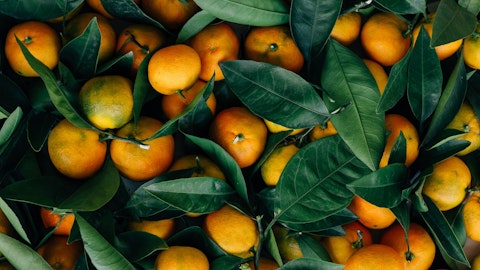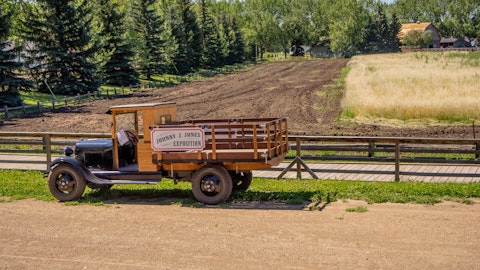Once that whole process is complete, we’ll see what sort of opportunities have presented themselves, at which point then the Board will make the decision to move forward with the process to explore the potential sale of some or all of the company or to continue down the path of the strategic plan that it has in place right now. So it’s an exciting time. We’re all really busy and a lot of things going on. But the possibilities and the potential looks pretty exciting for us at this point.
Rajiv Sharma: That’s great. So along the same vein, you’re reallocating the lemon acreage into avocado acreage. Can you comment on where do you see — obviously — so there is the California avocado premium. Where do you see that pricing? And where do you see Mexican pricing in the next year or two years, given what’s going on?
Harold Edwards: Yeah. I wish I had that crystal ball, but I will tell you this, that we believe that there is a wonderful niche that Ventura County and California can serve in the market window of avocado availability from May to July when the market is not as crowded with Mexican supplies or Peruvian supplies. And because we’re within 600 miles of our — a very, very strong customer base, we believe we have a significant logistical advantage to the market but also can deliver very fresh fruit that our customer base wants. And we believe that there’ll be a nice little premium that can be enjoyed during that time frame. So what I think is going to happen is that the seasonal window for harvesting and selling is going to truncate from May to July, but the values for those California avocados, we believe, will be significant and I think sustainable because there won’t be the strong pressure from the imported fruit to really come in and make the market that much more crowded.
So that’s our thesis for the transition, and we believe it’s sustainable. California as an industry is only going to produce 208 million pounds this year. And just for context, the U.S. is going to consume over 3 billion pounds. So it’s a real niche. It’s a small niche, but we believe it’s a sustainably very profitable niche and one that we believe we will have a great opportunity for our shareholders to participate in.
Mark Palamountain: And right now, we’ve seen avocado prices thereabout $1.50 a pound, up from about $1.20 just since post-Super Bowl. So typically, the U.S. consumes about 50 million to 60 million pounds a week. When you see a drop below that is when you start to see those prices creep up. And coming into April, May, we think we might have that opportunity.
Rajiv Sharma: Great. Thank you for answering the questions. I’ll take it offline. Thank you.
Mark Palamountain: Thanks, Raj.
Operator: [Operator Instructions] It appears that there are no further questions at this time. I would now like to turn the floor back over to Harold Edwards for closing comments.
Harold Edwards: Thank you very much. I’d like to thank you all for your questions and your interest in Limoneira. Have a great day.
Operator: This concludes today’s teleconference. You may disconnect your lines at this time. Thank you for your participation.
Follow Limoneira Co (NASDAQ:LMNR)
Follow Limoneira Co (NASDAQ:LMNR)
Receive real-time insider trading and news alerts




